During the past few years, Facebook has become the go-to platform for generating brand awareness and driving new leads. Highly targeted Facebook ads have generated much success for advertisers because they are shown to interested users that are more likely to make a purchase. Many businesses in various industries—beauty, finance, home improvement, to cite a few—have used Facebook to grow their customer bases and increase their sales. Real estate is among those industries. You can create high-performing ads that help convert potential homebuyers to homeowners.

Table of Contents
Why You Should Use Facebook Ads?
As of 2019, Facebook boasts more than 2.41 billion monthly active users, an eight-percent increase in monthly active users, year over year. Granted, 2.4 billion people aren’t looking for a home, but the large number gives you an idea of the breadth of your reach on Facebook.
With Facebook advertising, you can target a specific audience based on certain demographics, such as age, number of children, income, job title, education, location, homeownership status, and more. You can also target users based on their interests (i.e. the pages they’ve liked) and their behaviors (i.e. their past purchases, purchase intent, etc). Yes, with Facebook advertising, you can create ads that will appear to an audience that is most likely to be interested in your real estate business. If you don’t know how to take advantage of this lucrative advertising platform, consider consulting a Facebook advertising agency for professional help.
7 Strategies to Try
Of course, even though Facebook has been a helpful platform for many businesses, you should still use its advertising tools with a strategy; otherwise, your ads will likely underperform. There are several ways you can run your Facebook real estate ads.
1. Run Lead Ads
You can use Lead Ads, pre-populated forms that collect contact information from prospects. Because the forms are pre-filled, your target audience won’t have to take extra steps to give you the information: Instead of manually filling out a form on a landing page, your prospects can click on your ad and send their information (name, email, phone number) with just a tap of a button. Whether you’re trying to capture buyer or seller leads, you don’t have to send prospects off of Facebook. They can give their information right on the platform.
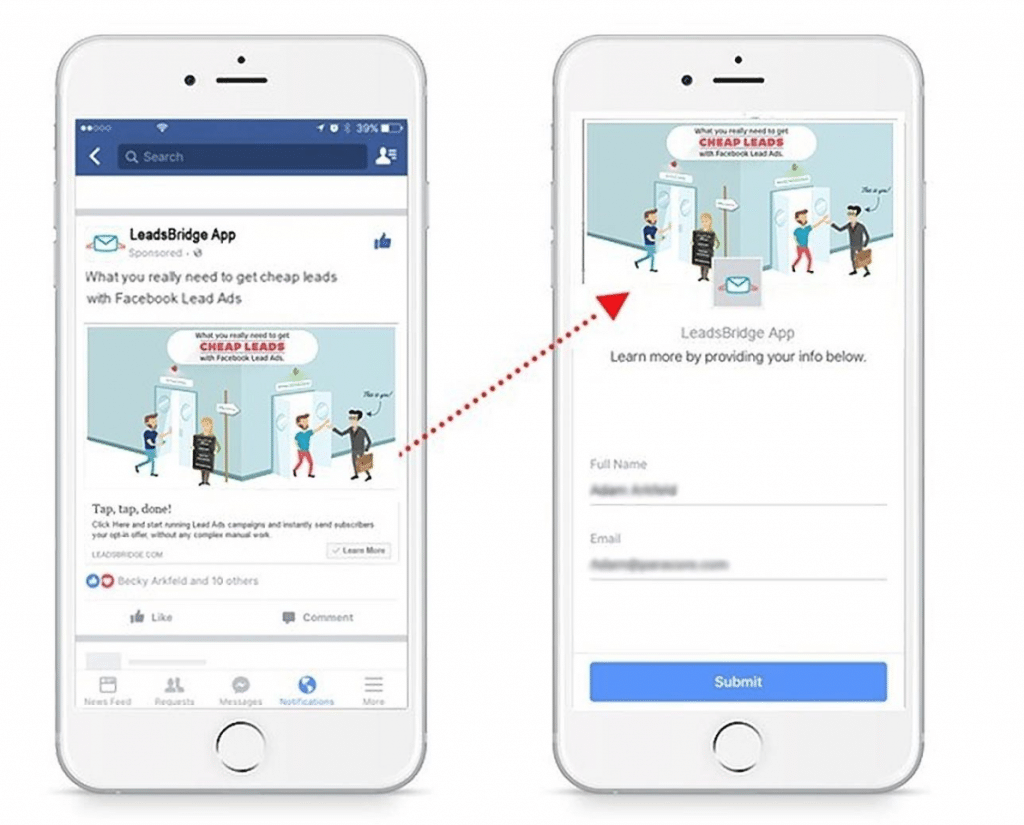
There are several benefits to Lead Ads. First, you don’t need a landing page, since users can fill the form straight from the ad on Facebook. Second, users can submit their information easily, often with just a click of a button, eliminating friction in the signup process. Third, you can funnel buyer and seller leads into your CRM or marketing automation software.
2. Segment Your Target Audience
Segmentation involves narrowing down your target audience to people who are more likely to commit a desirable action, which in your case is buying a home. In fact, on Facebook, you can get as granular as targeting people who are buying a house.
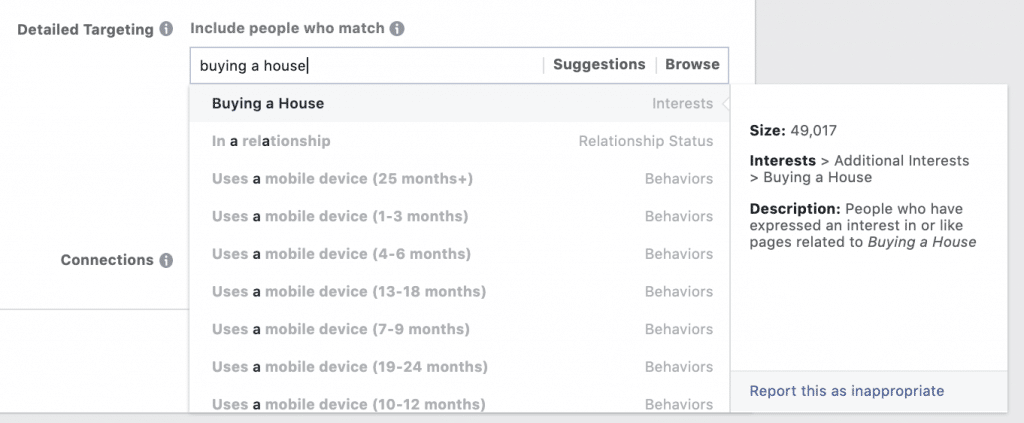
You can target homeowners by typing the keywords “buying a house” in the detailed targeting section of the ad set. By choosing this targeting option, categorized under interests, you will be sending your ads to Facebook users who have specified an interest in buying a house.
Still, you can get even more specific than that. In addition to the “buying a house” criterion, you can also target individuals in El Paso, Texas, with an average household income of $70,000. The combination of those two targeting criteria is important because targeting the homeowners in that specific area with that specific income alone does not suffice. Not everyone in that demographic has the intention to buy a house. The “buying a house” targeting option further narrows it down and allows you to make the most of your ad spend by targeting a highly specific audience.
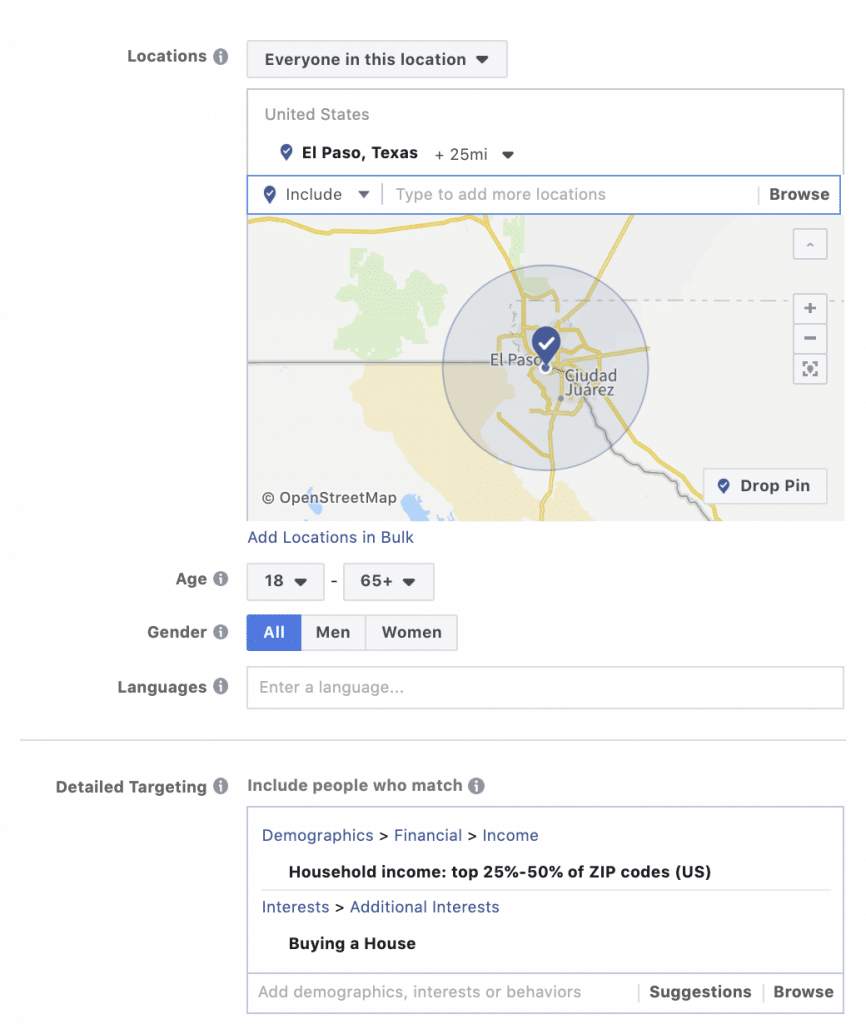
3. Target Real Estate Investors
Maybe you want to broaden the pool of prospects and target real estate investors as well. Under the detailed targeting section, you can choose the targeting option “real estate investing” to target people who have expressed an interest in real estate investing. It’s important to note that this targeting option is categorized under interest not behavior; meaning, you’re targeting people who aren’t necessarily real estate investors even though they have displayed an interest in the activity.
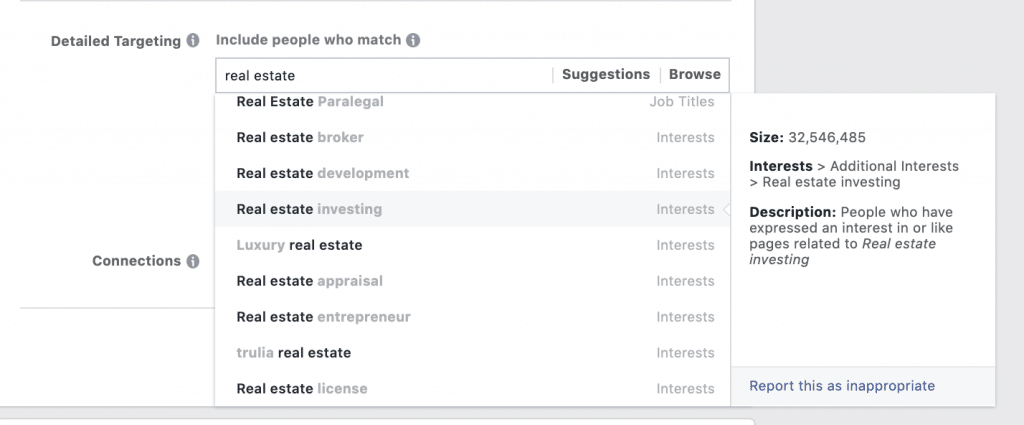
In addition to choosing “real estate investing,” you can also target people interested in famous real estate tycoons. For example, you can target people who have expressed an interest in the billionaire Roger Staubach. People who are interested in real estate investors such as Staubach are also likely to be interested in real estate investing.
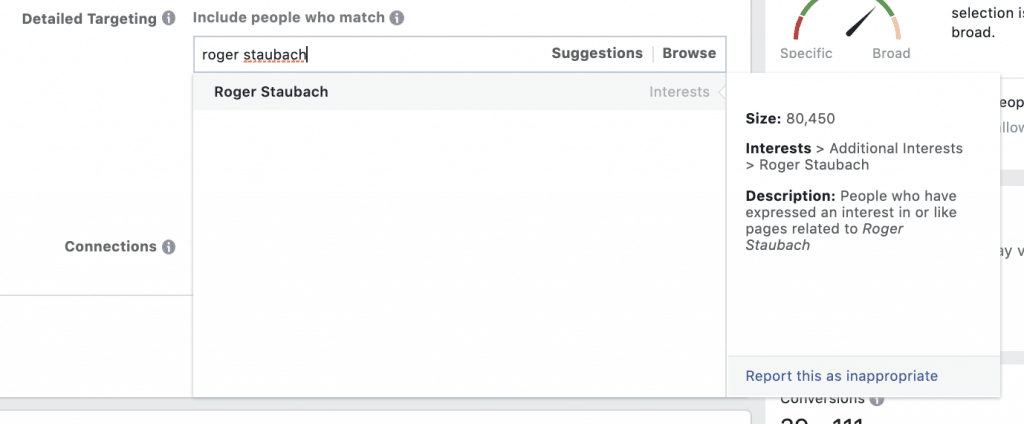
4. Target Users Who Visit Home Listing Sites
One way to reach your prospects is to target people browsing popular real estate listing sites. You have a higher chance of converting these leads because they’re already actively searching for homes—their purchase intent is high. Popular listing sites you can include in your targeting criteria include the following:
- Zillow
- Trulia
- Realtor.com
- Homes.com
- Redfin
- MLS.com
- Century 21 Real Estate
- HomeFinder
When adding these real estate sites to your targeting criteria, make sure to target interests, not employers. Targeting employers will cause your ad to appear in front of the people who work for the companies of those listing sites, not homebuyers.
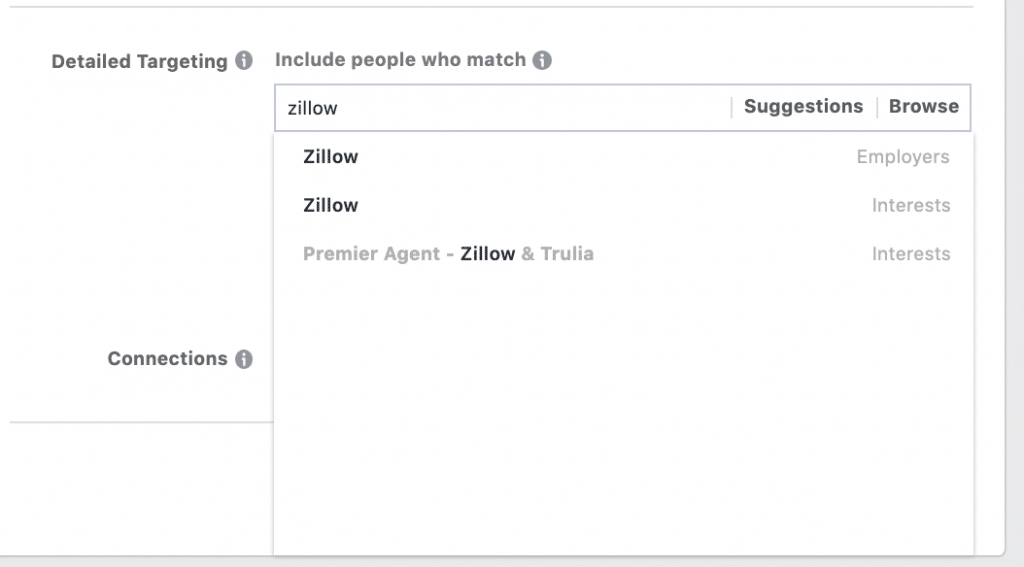
5. Run Home Evaluation Ads
If you want to attract seller leads, you can run free home evaluation ads on Facebook. By advertising this service, you can grab the attention of potential sellers because they’re likely curious about the value of their houses and the value of other homes in their neighborhood. If they plan to sell their homes, they would want to know the best-estimated figure to list them. This way, they’re more informed, which means they know which offers to accept and which ones to decline. Thus, home evaluation ads can be a great addition to your campaign.
6. Run Video Ads
Video is an effective format, especially in a visual industry such as real estate. There are many types of videos you can use in your ads, such as property tours, interviews, testimonials, live streams, and more. Here’s one example of a house tour from Zillow. The shots feature not only the exterior of the home but also the interior, bringing the viewer room to room.
Although this video is longer than the recommended for Facebook (a little over five minutes), the length is acceptable as it is posted on YouTube, where viewing times are typically longer. If you were to take this video and turn it into a Facebook ad, make sure to keep the video under one minute to maintain the attention of your audience. Additionally, make sure the most important point of the video appears within the first few seconds, in case your audience doesn’t watch the video in its entirety.
7. Run Testimonial Ads
Social proof is very powerful because people are more likely to use a product or service if someone else speaks highly of it. In fact, 84 percent of people claim that they trust customer reviews just as much as they would trust a recommendation from a friend. You can incorporate testimonials from past home buyers and sellers into your ads. There are a variety of ad options you can use to showcase your testimonials:
- Single image ads
- Carousel ads
- Videos ads
- Canvas ads
Once you’ve set up your testimonial ad, you can link to the landing page of your website that shows the full testimonials. You can set up a landing page either using WordPress or one of its many alternatives.
Many businesses from varying industries have found success with Facebook advertising, and the same is true for those in real estate. Before you dive into your ad campaigns, don’t forget to create a strategy to ensure the success of your ads. If you’re not sure whether Facebook advertisements are best for your real estate business, try comparing the pros and cons of Facebook ads vs. Google ads to get a better idea of what’s right for your next campaign.
Related Articles:
What Is Facebook Advertising?
7 Benefits of Using Facebook Advertising for Your Business
4 Ways to Leverage Facebook Messenger Ads
